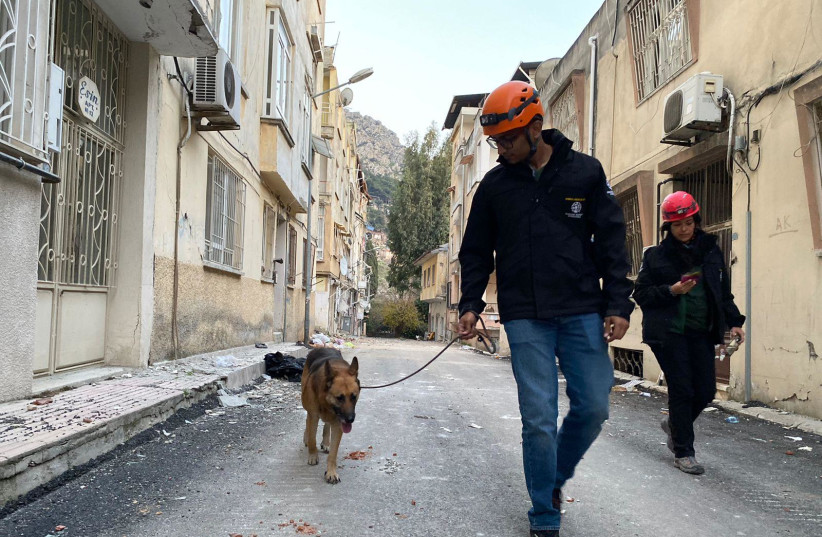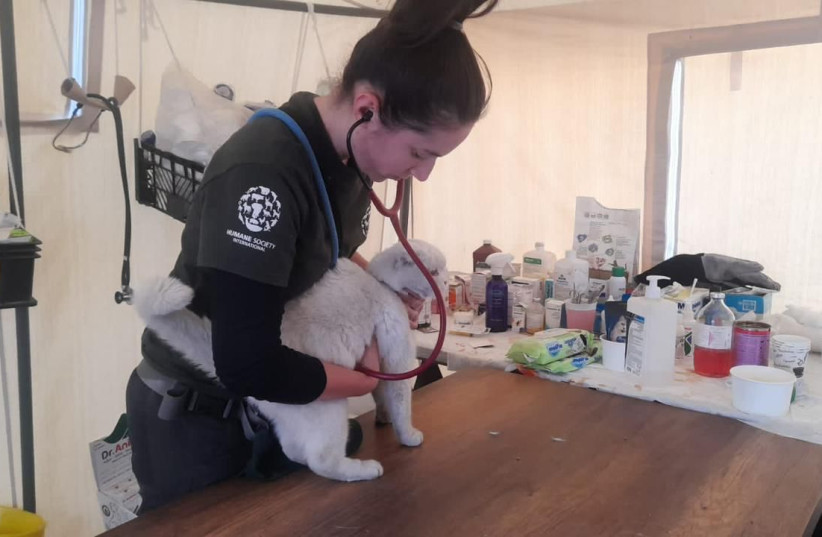Volunteers struggle to find homes for animals in Turkey’s earthquake region
Volunteers are still struggling to find homes for displaced pets in southeast Turkey, more than two months after a 7.8 magnitude earthquake hit the region.
According to veterinarian Görkem Ağdaş, his organization Meyako has helped about 200 animals in the region. Most pets displaced by the earthquake have already been returned to their owners, while those who the organization could not find previous owners for have been taken home by volunteers, he said.
“The condition of the animals in the earthquake area was not encouraging at all. They were in a state of fear and shock in the first weeks, then hunger was their biggest problem,” Ağdaş wrote in a message to The Media Line.
Meyako, which provides shelter for stray and abandoned animals, operates in some of the areas hardest hit by the disaster, including Hatay province and the towns of Kahramanmaraş, Adıyaman, and Malatya. Its operations have included setting up feeding centers for the animals, serving hundreds, and sending volunteers into badly damaged buildings to rescue trapped animals. The destroyed buildings and rubble limit the animals’ ability to shelter.
In addition to Meyako, some Turkish volunteers have also partnered with international organizations for more support. The Humane Society International decided to shift its work to focus on a group of local veterinarians in Antakya who knew the organization would stay in the area for the long term.
 Humane Society International’s animal disaster relief team at work in Antakya, Turkey after the earthquake, February 2023 (credit: Courtesy Humane Society International)
Humane Society International’s animal disaster relief team at work in Antakya, Turkey after the earthquake, February 2023 (credit: Courtesy Humane Society International)Estimated tens of thousands of homeless animals
Adam Parascandola, vice president of the Animal Rescue Team with Humane Society International, worked in Antakya after the quake and estimated there were tens of thousands of animals who are homeless.
“The amount of destruction in Antakya was really, really overwhelming,” he said.
Parascandola said his organization is helping provide caging and medical equipment to replace much of what was destroyed in the quake. He said that while some animals are treated locally, others must travel elsewhere for treatment if they have more severe issues. The organization has posted on social media to advertise animals that have needed adoption, with most of them going to Istanbul and the southwestern coastal town of Antalya.
“The shelters are really overburdened and over-crowded and we wouldn’t want to add to that issue,” he explained.
Parascandola said that while there was a large amount of interest in adopting animals immediately after the quake, that interest has waned in subsequent months, with increased difficulty housing older animals. The Humane Society also faced logistical barriers, with no running water and a stable source of electricity only established after the organization received permission to move to Antakya’s center. There are no stores open, forcing workers to travel up to an hour and a half away to get supplies.
For Parascandola, who has worked in other disasters, one thing stood out about Turkey: the local population’s love for animals.
“The street animals tend to be very friendly because they have a good relationship with humans,” he said.
 – A cat rescued by the Humane Society International’s animal disaster relief team in Antakya, Turkey after the earthquake, February 2023 (credit: Courtesy Humane Society International)
– A cat rescued by the Humane Society International’s animal disaster relief team in Antakya, Turkey after the earthquake, February 2023 (credit: Courtesy Humane Society International)According to the major Turkish newspaper Hürriyet Daily News, animal rights was the most popular cause in Turkey last year with 2.3 million signatures on Change.org, a website that allows people to create petitions. Another petition arguing for better treatment of animals in shelters and increased penalties for those who commit violence against them has received almost 350,000 signatures.
The Humane Society’s work was made easier by a law requiring owners to microchip their pets, meaning the organization could find the homes of lost animals more quickly. Parascandola said about a quarter of the animals they have found have homes to go back to.
Aside from earthquake-related injuries, many animals also had illnesses, such as skin and upper-respiratory diseases. Some of them had consumed poison left out as pest control by displaced people living in tents, Parascandola guessed. Some animals were injured through fights with each other due to increased competition for food after they were separated from their owners.
With three fault lines running across the country, Turkey is an earthquake-prone country, with a quake around the magnitude of 7.5 expected in Istanbul. Parascandola said his long-term hope is that the Human Society’s work in the country helps local groups organize their resources more effectively so that there is a more coordinated rescue effort if another disaster happens.
“Unfortunately, earthquakes do seem to hit Turkey on a fairly regular basis. And so I think that’ll be really critical for the country for the next time,” he said.





Comments are closed.